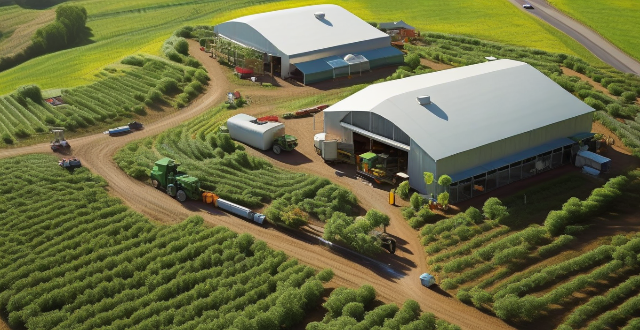Sustainable farming practices are crucial for maintaining food security amidst changing climate conditions. They help farmers adapt to these changes by enhancing soil health, improving water management, promoting crop diversification, and integrating livestock and crop production. These practices also mitigate the impacts of climate change on agriculture by reducing greenhouse gas emissions, promoting biodiversity, and encouraging renewable energy use. Supporting smallholder farmers through training, access to markets, and cooperatives is essential for implementing sustainable practices at a larger scale. Overall, sustainable farming practices are vital for building resilient agricultural systems that can withstand climate change while ensuring food security for future generations.

Role of Sustainable Farming Practices in Maintaining Food Security Amidst Changing Climate Conditions
Introduction
Climate change poses a significant threat to global food security, affecting both the quantity and quality of agricultural produce. The changing climate conditions can lead to increased frequency and intensity of extreme weather events, such as droughts, floods, and heatwaves, which can have devastating effects on crop yields and livestock productivity. In this context, sustainable farming practices play a crucial role in maintaining food security by adapting to these changes and mitigating their impacts on agriculture.
Key Points
Adaptation to Climate Change
Sustainable farming practices help farmers adapt to changing climate conditions by:
- Enhancing soil health: Healthy soils are more resilient to extreme weather events and can store more water, reducing the risk of crop failure during droughts.
- Improving water management: Efficient irrigation systems and rainwater harvesting techniques can help conserve water resources and reduce the impact of water scarcity on crop production.
- Promoting crop diversification: Diversifying crop varieties can help spread risks associated with climate-related shocks, ensuring that if one crop fails due to unfavorable conditions, others may still thrive.
- Integrating livestock and crop production: Mixed farming systems can improve nutrient cycling and enhance resilience against climate-induced stresses.
Mitigation of Climate Change Impacts
Sustainable farming practices also contribute to mitigating the impacts of climate change on agriculture by:
- Reducing greenhouse gas emissions: Practices like reduced tillage, organic farming, and agroforestry can help sequester carbon in soils, reducing atmospheric CO2 levels.
- Promoting biodiversity: Diverse ecosystems are better equipped to handle environmental changes, providing natural pest control and pollination services that support crop production.
- Encouraging renewable energy use: Solar-powered irrigation pumps and wind turbines can reduce reliance on fossil fuels for agricultural operations.
Supporting Smallholder Farmers
Smallholder farmers, who often lack access to modern technologies and financial resources, are particularly vulnerable to climate change. Sustainable farming practices can support them by:
- Providing training and education: Educational programs can teach smallholder farmers about sustainable practices that increase their resilience to climate change.
- Facilitating access to markets: Fair trade initiatives and community-supported agriculture models can help smallholder farmers sell their products at fair prices, ensuring they have sufficient income to invest in sustainable practices.
- Promoting cooperatives and farmer groups: These organizations can pool resources for purchasing inputs, sharing knowledge, and negotiating better terms with suppliers and buyers.
Conclusion
In conclusion, sustainable farming practices play a vital role in maintaining food security amidst changing climate conditions by adapting to these changes, mitigating their impacts on agriculture, and supporting smallholder farmers. By adopting these practices, we can build more resilient agricultural systems that can withstand the challenges posed by climate change while ensuring food security for future generations.